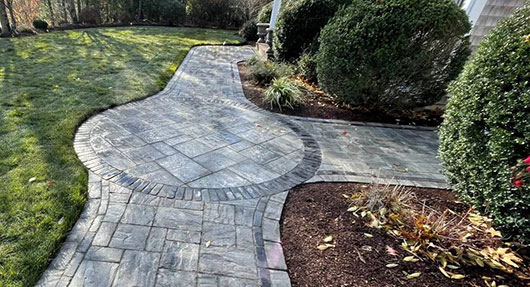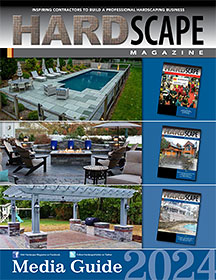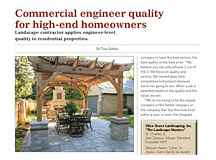Contractor Stories

“We turn around pool projects in 2 or 3 weeks if the ground's ready.”
1/2 the management team leaves the company
Mitch Andrea’s young 1-crew company still builds big projects as he works out how to fill in for the loss of his brother.
By Tom HatlenBrothers Mitch and James Andrea had been gearing up to go full-time in their company, Elmwood Landscapes, for years. Thing was: Mitch was prepping for a career in landscaping while James focused on real estate property management.
In advance of their 1st full-time season (2020), they worked it out with Mitch managing field operations and James handling the business side of things. In addition, they would both work in the field to get the company off the ground.
Their 10-year plan was for James to work on real estate part-time and eventually leave Elmwood to go full-time. As things evolved, the 10-year plan became a 3-year plan and James left the company at the end of 2022.
Mitch says, “James started to get into more opportunities and it was one of those things where you can only do so much on the side for so long. He needed to jump feet first. We were able to work things out.”
Profile
Elmwood Landscapes, LLC
Elmwood, MAEstablished 2018, Full Time 2020
Owner Mitch Andrea
Customer base
90% residential10% commercial
Services
60% hardscaping30% landscape & softscapes Installation
10% Irrigation & lighting installation & maintenance
Project price range
$30,000 to $150,000Annual sales
$1.4 millionEmployees
4-6Big shoes to fill
Mitch is still working out how to fill in for the loss of his brother, his partner and key employee. James managed company finances and insurance, handled the office work, set up appointments, dealt with customers and with legal and regulatory issues.In the field, James was a highly skilled part of the company’s only crew. He internalized the company’s efficiency mindset and helped drive their positive culture.
Mitch was busy before. Now he’s crazy busy. “My job never ends. I'm up by 4am every morning trying to stay ahead of everything. I think it's going to be a work in progress to try and keep me in the field at least 50%. I've got some good guys working with me, so that definitely helps. I don't need to be packing up the trucks in the morning. The guys know what's coming up so they can do that.”
Relying on others
Mitch is trying to ease his workload by relying on others like their lawyer, CPA, bookkeeper and office manager. “So that’s taking a lot of stress off of it. I really just deal with accounts payable, accounts receivable, and estimating like I did before James left.“Our bookkeeper goes in and checks QuickBooks regularly, and she's a wizard at it. Something that would take me 4 to 6 hours she can do it in 30 minutes.”
“Our office manager Jill has been doing an amazing job. She's a big deal. She didn't work a lot of hours for us last year. Now she's working 20, 25 hours a week. She keeps everything organized and keeps us ahead of schedule.
“She tries to stay ahead of me as far as customer relations, letting clients know when we're coming, or making sure that we drop off a porta potty, etc. She’s helping us set up standard operating procedures and more systems so that things don’t fall through the cracks.”
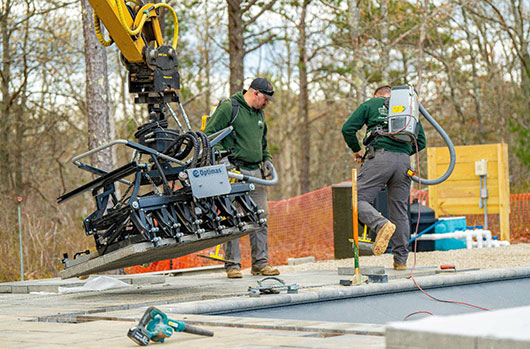
The goal is to develop skilled employees and give them all the tools they need to work as efficiently as possible.
Developing great employees
With James gone and Mitch busy in the office, Elmwood’s crew picks up the slack. From the company’s beginning, the goal was to focus on hiring people who want to improve themselves, get their CDL, hoisting licenses and certifications, and in the process also improve their compensation. Mitch isn’t interested in hiring career laborers.“Our crew is doing really well. We have 2 guys growing their leadership skills. We give them free reign to be in control of their own destiny. I don't have to babysit them, and they don't want to feel like they are being babysat.
“I would rather build a small competent team that really works well together than have a whole bunch of unskilled people who don't take pride in their work.”
Mitch believes in education to the point where he currently has 2 high school co-op students working in the company. They are on a work program with a vocational technical school where they’re in class 50% and working for Elmwood 50%. Mitch is on the board overseeing the program. “They're not super profitable because they’re still learning, but they're also the next generation.”
Mitch makes a point to pair the co-op students with his skilled people to learn the trade. They don’t just do the grunt work.
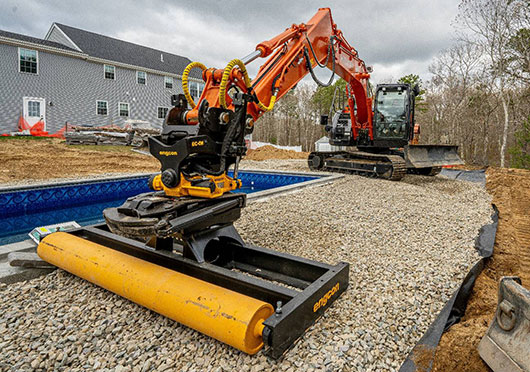
The Engcon Tiltrotator is Mitch’s newest and favorite piece of equipment. “It spins the bucket 360 degrees and tilts it 45 degrees so you can get into all kinds of crazy corners. One guy can do the job of 2 or 3 people. With the EC-Oil quick attach, you never get out of the machine to change out hydraulic couplers. You can change attachments from a 12” bucket to a 4’ bucket in maybe 30 seconds to a minute.”
Equipment-based company
The goal is to develop skilled employees and give them all the tools they need to work as efficiently as possible so they can feel accomplished at the end of each day and are ready to do great things the next day.“We’ve set up our company to be mostly equipment based. We want to minimize how much manual labor our guys have to do. We invest heavily in equipment that allows our guys to get more production done without killing themselves, so that they can keep working in this industry for the next 30, 40 years.
“We rarely use a wheelbarrow. We'll drive a piece of equipment right across the lawn. Loam is cheap. I'd rather re-loam your entire yard before I have people pushing 20 wheelbarrows of stone across the lawn.
“We set ourselves up to be efficient with trucks, equipment and tools. And, we just fly through jobs that other people would drag their feet on or become overwhelmed.”
Big jobs
Those jobs they fly through are often $100,000+ projects. Mitch has never shied away from big jobs. He credits his education from Bill Gardocki at the UNH Thompson School. And, he credits his last employer, Cary Whitmore at Whitmore's Yard Care.At the Thompson School Mitch learned the foundation for estimating and installing projects of all sizes. Whitmore’s occasionally took on large projects when Mitch ran the construction division for 2 of his 5 years there. “I got a lot of experience in managing projects. I think once I got the basics, it just became easier to apply them to these bigger projects.”
He left Whitmore’s with enough experience to land his own large projects. “In 2020, we did a 1,700 sf pool project. Once we posted it on social media, it escalated from there. We were booked out like 3 months most of that first year.
“Large projects have become our specialty. We can come in to do a really nice detailed product in a timeframe that most people would take 1-1/2 to 2 times what we would take. We turn around pool projects in 2 or 3 weeks if the ground's ready. We move as efficiently as possible. That’s our mindset. It’s an important part of our company culture.”

It didn’t just happen
It took more than experience and training to get Elmwood Landscapes off the ground. “Before starting the business, we were buying tools and saving money for years. Even when we were kids cutting grass, we would always save that money.”They did a lot of side work while going to college and while working for other companies. “A lot of that money went toward buying hand tools. We bought a truck. We started buying equipment. It was a lot of time and planning so we already had about 50% of the tools that we have today.”
It’s been a transition to where Elmwood is no longer set up for small projects. “We don't really mess with stand-alone small walkways anymore. We have too much stuff and overhead's too high for us to do those small projects.
“So we're in that niche where people call us to do bigger projects because they know that we can handle it. They know we're going to make sure it's done right and we're going to put a warranty on it.”
Mitch still looks to Cary at Whitmore’s for advice. And he and James sometimes talk about business. “I think James starting up his own business was best for both of us and our futures. We’re both working towards our goals.”
